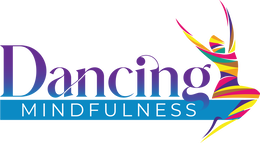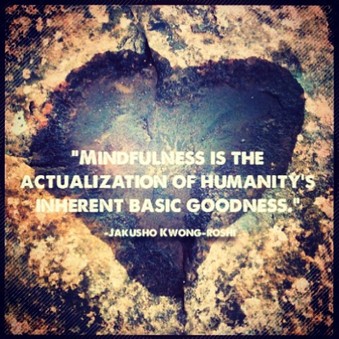|
Originally published on StartAgain Media
“Mindfulness is the actualization of humanity’s inherent basic goodness.” -Jakusho Kwong-roshi This program’s content is primarily self-discovery or self-care in nature and is not acceptable as continuing education. Several continuing education approval boards, including my own profession’s in my home state, use this line, or some variation of it, to reject programs related to yoga, compassion fatigue, self-care, or any other programs that they deem to be too “new age,” “expressive,” or “experiential.” It’s sad to say that at this point, I’m used to writing appeal letters and making a case for the legitimacy of mindful, experiential learning as valid continuing education for helping professionals. In fairness, not all regulatory continuing education overseers are in the dark ages; just about all of the national accreditation bodies are on board with the legitimacy of mind-body healing and creative approaches to learning. My negative experiences have been largely on the state level. Last year, when I stood before the counselor standards board of my home state, my jaw dropped and I literally froze in shock to hear one of the members say, “We set a dangerous precedent when we call self-care education. Some of the programs you do are more about professionals trying out some of these things (e.g., yoga, dance, meditation), and counselors should be doing that on their own time. Before long, counselors are going to want to count going on retreats and chanting and lighting incense and going to their own therapy as education. Education is education and self-care is self-care.” After taking some deep ujjayi breaths to move from the freeze response, I suggested that if we awarded counselors a certain portion of their required continuing education credits to try out events and programs that teach them how to take care of themselves better, then maybe we wouldn’t have such high rates of burnout. Maybe there wouldn’t be so many ethical violations. Self-care, in the eyes of many of us, is the most valuable continuing education of all. . The anger I experienced in response to their ignorance about the value of self-care as education has made me turn to the literature to further craft some of my arguments. There are over twenty peer-reviewed articles presenting research from both a qualitative and quantitative perspective on the value of self-care, particularly mindfulness meditation training, While I am currently in the process of formally synthesizing and reviewing these for an academic article, I wish to share with you some of the most poignant conclusions from this cannon through my blog: · Promoting mindfulness in psychotherapists-in-training could positively influence the therapeutic course and treatment results in patients (randomized, double-blind controlled study; Grepmair, Mitterlehner, Loew, et al, 2007) · Health care professionals participating in a mindfulness-based stress reduction program (MBSR) were able to more fully identify their own themes of perfectionism, the automaticity of “other focus,” and their tendencies to always enter “fixer” mode; this recognition led to numerous changes along personal and professional domains (grounded theory; Irving, Park-Saltzman, Fitzpatrick, et al., 2014); a similar study that exclusively studied nurses yielded similar findings (Frisvold, Lindquist, McAlpine, 2012) · In an extensive mixed methods research study with working psychotherapists from a variety of theoretical backgrounds, Keane (2013) concluded that personal mindfulness practice can enhance key therapist abilities (e.g., attention) and qualities (e.g., empathy) that have a positive influence on therapeutic training. He contends that mindfulness practice could provide a useful adjunct to psychotherapy training and be an important resource in the continuing professional development of therapists across modalities. In another qualitative study article that demonstrates the positive impact of mindfulness training on therapist trainees, Christopher, Chrisman, Trotter-Mathison, et al. (2011) make one of the wisest contentions that I’ve ever read in peer-reviewed literature: Although self-care is often touted as being important to counselors and psychotherapists, historically little has been done within graduate school to provide future therapists with self-care strategies (p. 318). When I was a graduate student at both the Master’s and Ph.D. level, little, if anything was said about the importance of self-care. In working with graduate students as a mentor and supervisor myself now, it saddens me that the landscape is still pretty bleak in most programs. If you are in a graduate program or have gone through one where self-care and self-discovery was promoted, I would be very happy to hear from you about your experiences and how they impacted your formation as a helper. For those of us who believe in the value of self-care and self-discovery and have experienced its benefits in our professional formation, the responsibility is ours to speak out about how it works. References Christopher, J.C., Chrisman, J.A., Trotter-Mathison, M.J., Schure, M.B., Dahlen, P., & Christopher, S.C. (2011). Perceptions of the long-term influence of mindfulness training on counselors and psychotherapists: A qualitative inquiry. Journal of Humanistic Psychology, 51(3), 318-349. Frisvold, M. H., Lindquist, R., & McAlpine, C. P. (2012). Living life in balance at midlife: Lessons learned from mindfulness. Western Journal of Nursing Research, 34, 265-278. Grepmair, L., Mitterlehner, F., Loew, T., Bachler, E., Rother, W., & Nickel, M. (2007). Promoting mindfulness in psychotherapists in training influences the treatment results of their patients: A randomized, double-blind controlled study. Psychotherapy and Psychosomatics, 76, 332-338. Irving, J.A., Park-Saltzman, J., Fitzpatrick, M., Dobkin, P.L., Chen, A., & Hutchinson, T. (2014). Experiences of health care professionals enrolled in mindfulness-based medical practice: A grounded theory model. Mindfulness, 5, 60-71. Keane, A. (2013). The influence of therapist mindfulness practice on psychotherapeutic work: A mixed-methods study. Mindfulness. DOI: 10.1007/s12671-013-0223-9.
0 Comments
Leave a Reply. |
Dr. Jamie MarichCurator of the Dancing Mindfulness expressive arts blog: a celebration of mindfully-inspired, multi-modal creativity Archives
September 2022
Categories
All
|
Contact |
Memberships & Affiliations |
|
Please direct all inquiries to:
[email protected] © Mindful Ohio & The Institute for Creative Mindfulness, 2021 Terms of Use Privacy Policy |
Dancing Mindfulness/The Institute for Creative Mindfulness is an organizational member of the International Association of Expressive Arts Therapists, the Dance First Association, and NALGAP: The Association of Gay, Lesbian, Bisexual, Transgender, Addiction Professionals and Their Allies; Dancing Mindfulness proudly partners with The Breathe Network and Y12SR: The Yoga of 12-Step Recovery in our shared missions.
|


 RSS Feed
RSS Feed